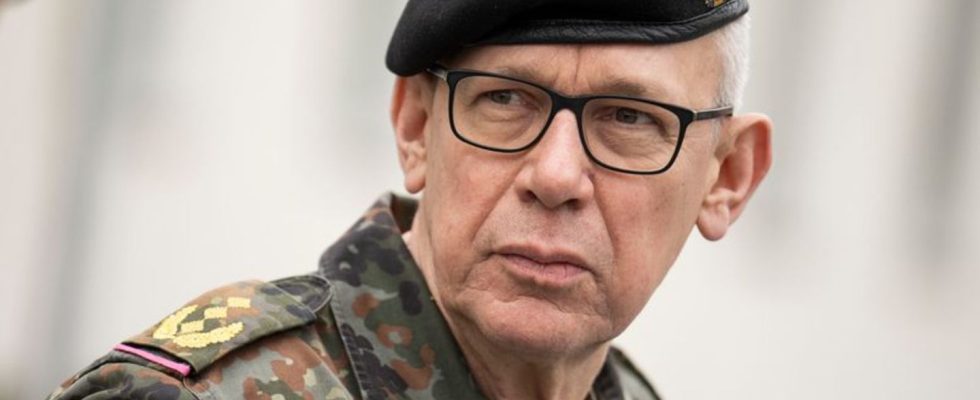The commander of the operational command is convinced that foreign operations and NATO defense are closely linked even after the so-called turning point. Big problem: the fight against drones.
The commander of the Bundeswehr’s operational command, Bernd Schütt, has warned of Russia’s increasing military influence in African countries. This shows that international crisis management and national and alliance defense are linked, said the lieutenant general of the dpa. “The need to be able to handle both militarily at the same time is a central challenge, not only for the German armed forces. A pure focus on national and alliance defense according to the motto that the shirt is closer than the trousers will not work.”
The Bundeswehr’s operational command is based in the Henning von Tresckow barracks in Schwielowsee near Potsdam. The Bundeswehr is in the midst of a realignment due to the Russian war of aggression against Ukraine and after the end of major foreign missions in Afghanistan and Mali. The defense of Germany and the NATO partners is the old and new main task. It is now important to politically weigh up where the Bundeswehr is involved in each individual case, depending on interests and available military capabilities.
Influence expanded step by step
“In addition to alliance policy issues, geopolitical issues also play an important role. These include, among other things, access to world markets and raw materials, usable transport routes and freedom of the seas, etc.,” said Schütt. “We won’t be able to ignore that.”
After the military coups in West Africa in recent years, Russia has gradually expanded its influence and replaced the commitment of Western and European states. The Russian presence forms a land belt that could stretch almost from the Atlantic to the Red Sea.
“Russia is militarily active in Burkina Faso and Mali. There are signs of beginning military cooperation in Niger,” said Schütt. “Meetings are taking place at a political level in Chad. In Sudan, we don’t yet know exactly how things will develop. Russian forces have been active in Libya since 2016.”
“Russia wants to fill gaps relevant to security policy”
In his opinion, the overarching Russian intention is “to fill gaps relevant to security policy.” Schütt said: “It’s not about overturning the situation in one big blow, but rather about constantly changing it to your own advantage and pushing back Western influence. To do this, Russia immediately and specifically uses the corresponding vacuum.”
Russia’s military commitment is not aimed at sustainability in the Western sense, but is aimed precisely at a gap in Western commitment that is perceived in the countries. “What do you need? Equipment? Will be delivered promptly. Kinetic support? Will be granted without any special conditions. Advisors? Will be sent unbureaucratically. There is no talk of a networked approach and state building in the Western sense, that doesn’t happen with Russia,” he said General. From a military perspective, “support in the region” remains important for Germany and its partners when it comes to tasks such as the evacuation of its own citizens.
Significantly increased threat from drones
The operational command has already made some changes for tasks in national and alliance defense last year and is now also implementing these for the special forces and other areas. “The point that you have to be prepared is a valid one. We also practice and test how the troops should be led nationally in such a case,” said Schütt. As with other armed forces, the portfolio of tasks now also includes so-called “targeting”, in which possible enemy targets are collected and analyzed with a view to combating them.
Schütt identifies deficits in the Bundeswehr primarily when it comes to combating unmanned systems. “We see a significantly increased threat from drones. Things that fly through the air, that drive through the water or that move on the ground, remotely controlled and equipped with the appropriate means of action. In large numbers. There is a need for action in terms of adapting our own operational principles and in terms of procurement,” the general said. And: “This has to happen quickly now. For me, the central areas in this context are air and drone defense as well as the use of our own drones.”
Have to expect “strategic surprises”.
It is hardly possible to think in timelines. Recently, warnings have become louder that Russia could be ready for a confrontation with a NATO country in the coming years. Schütt warns: “I’m definitely not a fan of assuming self-imposed timelines when it comes to the threat, where you believe that the enemy cannot act beforehand. We always have to expect “strategic surprises”. We have to prepare for this structurally, adapt materially, personnel and procedurally.”
The Balkans are seen as a region where NATO could be challenged. The alliance has taken on a special responsibility there, without states like Kosovo or Bosnia-Herzegovina being members of NATO. However, an attack or outbreak of hostilities could challenge the West’s binding forces.
“The situation in Kosovo has deteriorated significantly in the last year. Right now it is calmer again, but everyone knows that things are fermenting beneath the surface,” said Schütt. “Everyone knows that KFOR is a NATO mission, so NATO is called upon. The question of how far we will succeed in stabilizing the Western Balkans is a very central question, also with regard to NATO’s credibility.”

